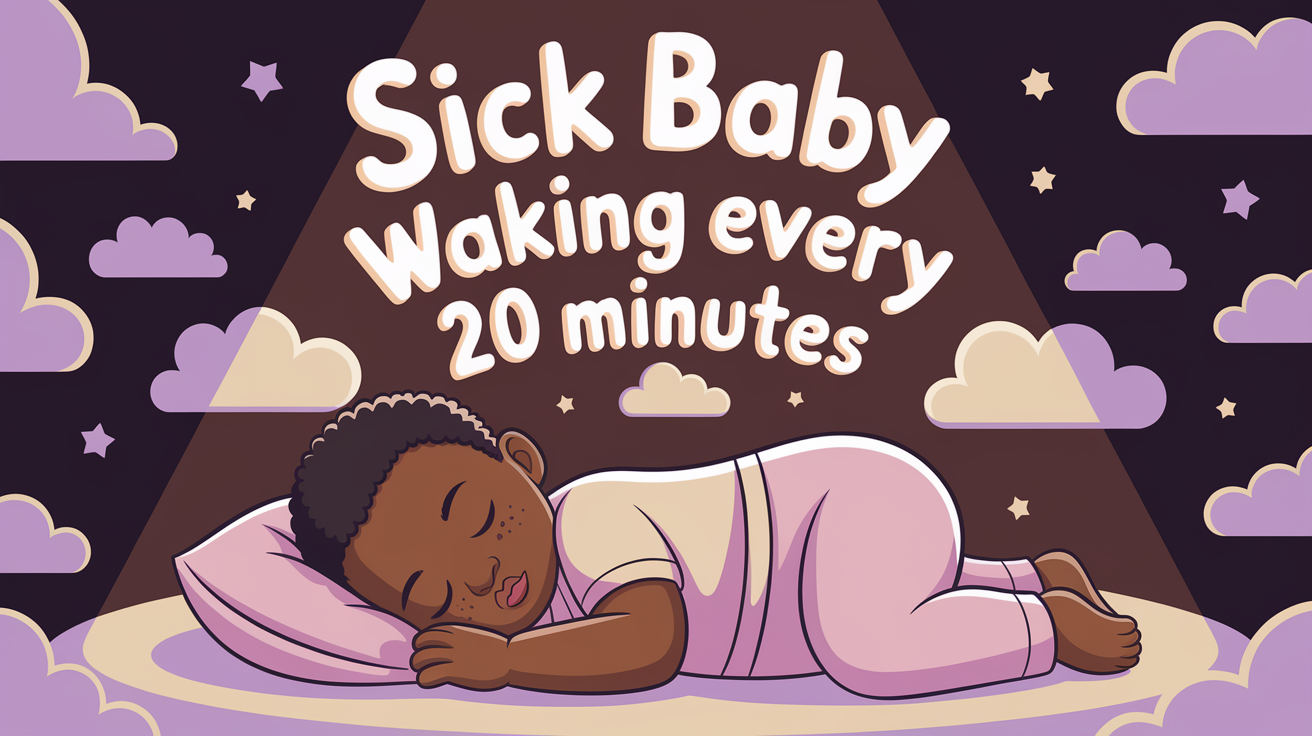
The midnight chorus of your baby’s cries every 20 minutes signals more than just a sleepless night, and it’s often your little one’s body fighting illness.
This frustrating pattern emerges when sickness disrupts the tender balance of your baby’s sleep cycles, turning what should be peaceful rest into fragmented periods of discomfort.
As a parent, these nights become a special kind of exhaustion: You’re simultaneously worried about your child’s health and desperate for everyone to get some sleep.
Understanding why illness causes these frequent wake-ups empowers you to respond effectively. From respiratory congestion and fevers to ear pain and stomach pain, various symptoms create unique sleep challenges.
Recognizing these patterns is your first step toward helping your baby and yourself find comfort and rest during these challenging nights of illness.
Why Your Sick Baby Might Be Waking Every 20 Minutes?
When your baby is sick, peaceful sleep becomes a distant memory. Those frequent 20-minute wake-ups aren’t just exhausting; they’re concerning.
This disrupted sleep pattern often happens because illness affects your baby’s breathing, comfort, and ability to self-soothe.
Your little one’s immature immune system is working overtime, causing discomfort that interrupts their natural sleep cycles. Congestion, fever, pain, and heightened anxiety all contribute to this fractured sleep pattern.
The good news? You can help. Creating a humidity-friendly environment, using gentle elevation techniques, maintaining hydration, and knowing when to consult your pediatrician can change those restless nights into more restorative sleep for everyone.
Why Do Sick Babies Wake Up Frequently at Night?

When illness strikes, your baby’s soft sleep patterns often collapse. Their immature immune system works overtime, causing discomfort that fragments sleep into frustratingly short intervals.
Understanding the specific mechanisms behind these disruptions can help you respond effectively and compassionately, ensuring both you and your little one get the rest needed for recovery.
1. Common Illnesses That Cause Nighttime Disturbances
Colds trigger congestion and coughing that jolt babies awake. Ear infections create painful pressure that intensifies when lying down. Stomach bugs cause digestive discomfort and potential dehydration.
RSV and croup can frighten babies with labored breathing. Even teething, with its low-grade fever and gum pain, can fracture nighttime sleep.
2. How a Fever or Cough Affects Your Baby’s Sleep?
Fevers disrupt your baby’s internal temperature regulation, causing alternating hot and cold sensations that frequently wake them. Persistent coughing triggers a startle reflex, preventing deep sleep cycles.
These symptoms also heighten thirst and discomfort, making it nearly impossible for your little one to stay asleep for extended periods.
3. The Role of Nasal Congestion and Breathing Issues
Babies are obligate nose-breathers, making even mild congestion feel suffocating to them. When mucus blocks tiny nasal passages, your baby must wake to breathe through their mouth something that doesn’t come naturally.
This breathing struggle triggers panic and disrupts their sleep cycle precisely when restorative rest is most crucial for healing.
What You Can Do to Help Your Sick Baby Sleep Better?

When illness disrupts your baby’s sleep, your response can make all the difference. Creating a supportive healing environment while addressing specific symptoms helps your little one find comfort amid discomfort.
These practical strategies work together to maximize sleep quality during illness, supporting your baby’s recovery while preserving your sanity during these challenging nights.
1. Comforting Your Baby with the Right Sleep Environment
Promote the crib mattress slightly to ease congestion and breathing. Use a cool-mist humidifier to moisten airways and loosen mucus.
Keep the room slightly warmer than usual (68-72°F) but not hot. Consider white noise to mask coughing sounds and create familiar sleep cues.
2. Using Medication (When Appropriate) to Relieve Symptoms
Consult your pediatrician before giving any medication. Infant acetaminophen or ibuprofen (for babies over 6 months) can reduce fever and pain.
Avoid over-the-counter cough medicines, which aren’t safe for babies. Consider saline drops with gentle suction before sleep to clear nasal passages.
3. The Importance of Hydration and Proper Nutrition
Offer frequent small feeds to maintain hydration, which is especially crucial during fever. Breastfeed more often, as it provides antibodies and comfort.
Formula-fed babies may need smaller, more frequent bottles. Watch for wet diapers as indicators of adequate hydration.
4. Gentle Baby Massage or Rocking Techniques to Soothe
Try gentle chest massage with diluted essential oils (for babies over 3 months). Rock in an upright position to ease congestion while providing comfort.
Use skin-to-skin contact to regulate your baby’s temperature and heart rate. Keep movements slow and rhythmic, maintaining a consistent pattern.
When to Seek Help from a Pediatrician?

While most childhood illnesses are resolved with home care and time, knowing when to seek medical help is crucial.
Some symptoms signal more serious conditions that require professional intervention. Trust your parental instincts know your baby best.
When in doubt, contacting your pediatrician provides both peace of mind and necessary medical guidance during those worrying nighttime hours.
Signs That Indicate You Should Contact a Doctor
Contact your pediatrician if your baby has a fever above 100.4°F (38°C) and is under 3 months old. Seek medical attention for difficulty breathing, unusual lethargy, or refusing to feed. Watch for fewer wet diapers, which may indicate dehydration.
Call immediately if you notice a rash that doesn’t blanch when pressed or persistent vomiting.
Understanding the Difference Between Normal and Abnormal Sleep Behavior
| Normal Sleep Behavior | Abnormal Sleep Behavior |
|---|---|
| Frequent wakings due to illness, but periods of restful sleep. | Inability to sleep at all or extreme irritability when awake. |
| Sleep patterns should gradually improve over several days. | Persistent sleep disruptions after other symptoms have resolved. |
| Recovery should be expected within a few days. | Significant pain or discomfort despite efforts to soothe. |
| Contact your doctor if sleep disturbances continue after recovery. | Seek medical advice if your baby appears in constant discomfort. |
Prevention Tips: How to Help Your Baby Stay Healthy and Sleep Well
While you can’t prevent every illness, proactive measures significantly reduce their frequency and severity. A strong immune system and healthy sleep habits create a foundation of resilience that helps your baby weather unavoidable illnesses with less disruption to their sleep patterns.
These preventive strategies become especially valuable during cold and flu season when exposure risks increase.
Creating a Healthy Sleep Routine
Sleep routines aren’t just beneficial for healthy babies—they become even more crucial during and after illness. A well-established rhythm helps your little one’s body recognize when it’s time to rest, making it easier to return to normal patterns once they’re feeling better.
Consistency is the foundation of restorative sleep when designing your baby’s sleep routine. The predictable nature of these routines creates a sense of security that can help override some of the discomfort from illness.
- Establish a consistent bedtime between 6:30-7:30 PM to align with your baby’s natural circadian rhythm.
- Implement a calming 20-30 minute pre-sleep routine with dimmed lights, quiet activities, and gentle physical contact.
- Consider a warm bath, infant massage, or story time as soothing transition activities.
- Maintain the same sequence of events each night to create predictability and security.
A well-designed sleep routine provides your baby with clear signals that it’s time to wind down. This consistency builds healthy sleep associations that can persist even during minor illnesses, giving your little one familiar comfort when they’re not feeling their best.
The predictable pattern also helps regulate their internal clock, making it easier to return to normal sleep patterns after recovering from sickness.
Strengthening Your Baby’s Immune System
Your baby’s immune system is their first line of defense against illness. While occasional sickness is inevitable, you can build a stronger foundation that reduces both the frequency and severity of those middle-of-the-night wake-ups.
Research shows that specific lifestyle choices significantly impact your baby’s developing immune response. These simple yet powerful practices create a protective shield that helps your little one fight off common illnesses more effectively.
- Support breastfeeding when possible, as breast milk contains antibodies that protect against illness.
- Ensure your baby receives age-appropriate vaccinations to prevent serious diseases.
- Prioritize proper nutrition with a variety of fruits, vegetables, and whole foods when starting solids.
- Limit exposure to sick individuals, especially during your baby’s first few months.
Building your baby’s immune defenses starts with nutrition and extends to their overall environment. Adequate sleep strengthens immunity, creating a positive cycle where good sleep promotes better health, which in turn supports better sleep.
Regular outdoor time (with appropriate sun protection) provides vitamin D and fresh air that contribute to your baby’s resilience against common illnesses.
Final Thoughts
While those nights of constant wake-ups may feel endless, they represent a temporary chapter in your parenting expedition.
Your baby’s frequent night-wakings during illness are both normal and necessary—their body is working overtime to heal, and they need your support through this process.
By implementing the strategies we’ve discussed—creating a supportive sleep environment, maintaining proper hydration, using appropriate comfort measures, and knowing when to seek medical attention—you’re providing crucial care that supports recovery.
Remember to care for yourself during these challenging periods, too, as your well-being directly impacts your ability to comfort your little one.
Soon enough, as your baby regains health, those 20-minute wake-ups will fade into memory, replaced by peaceful nights and the quiet satisfaction of having guided your child through illness with patience and love.








































































